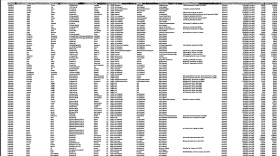As hosts of the first-in-the-nation presidential primary, Granite Staters often claim a reputation for political sophistication and civic engagement. But a new report finds that relatively few residents are politically involved and, when Election Day rolls around, they are more likely to accept the status quo and stay home rather than cast a ballot.

The Coalition for Open Democracy, a non-partisan effort to improve the health of New Hampshire's democratic institutions, released a 40-page report Thursday loaded with data on a half-dozen measures, including voting patterns, money in politics, and electoral competition.
The big take-away -- that factors have conspired to weaken representative democracy in the state -- isn't unique to New Hampshire. And it probably won't come as a surprise to many people. But some of the report's details challenge the conventional wisdom that politics is a passion here.
Consider, for example, that only 20 percent of Granite Staterscould name their state and federal representatives in 2014. Even fewer have taken the time to contact an elected official or join a civic organization, a sort of apathy that's reflected in the data below on who votes in New Hampshire and when. (All graphics come directly from the Open Democracy Index released this week.)

The good news is that 47 percent of the state's voting age population (VAP in the above table) turned out for the 2014 midterms. That's compared to just over 33 percent nationally.
The not-so-good news is that while pride in the first-in-the-nation primary may be high, actual participation averages around just 50 percent when candidates from both parties are up for election.
The news at the state and local election level is worse. Turnout in state primaries averaged less than 17 percent from 2000-2014. And as the chart below shows, municipal elections barely register with the state's voting age population. Less than 15 percent from the state's five largest cities turned out in 2013.

With fewer Granite Staters engaging in the electoral process, out-of-state forces are playing a greater role in helping determine who wins public office.
A record-breaking $106 million was spent on New Hampshire's congressional and state races in 2014. More than half, about $60 million, came from "independent" political committees with little or no New Hampshire ties.
The following charts break down the split in candidate and outside interest money in the most recent state elections.

Post-Citizens United, spending by political action committees and other outside (i.e. non-candidate) groups now dominates federal elections. But, as the cost of running for a seat in the New Hampshire legislature rises, so does the amount of outside spending in those races.
At every level, outside money exceeded candidate spending in 2014. Perhaps most surprising, more than half the $20 million spent on state House and Senate races that year came from PACs and political non-profits.
Similarly, out-of-state dollars play a significant role in New Hampshire elections -- more so in the last two elections than in any time over the past decade. In the 2014 U.S. Senate race, out-of-state donors gave at a 5-1 rate over in-state contributors. The split was less stark for Congressional races, but even for state races (governor, executive council, etc.) out-of-state donors provided more than 25 pecent of all dollars spent that year.

That trend saw a big jump in 2012, when Maggie Hassan and Ovide Lamontagne combined to spend more than $20 million in the governor's race. But even last year, out-of-state dollars were well above the amount from a decade earlier.

The full report also looked at issues such as State House lobbying, and the question of how well office holders reflect the demographics of their constituents. And in most every case, the data takes a bit of the shine off New Hampshire's reputation as a beacon of democracy.








